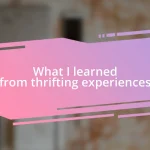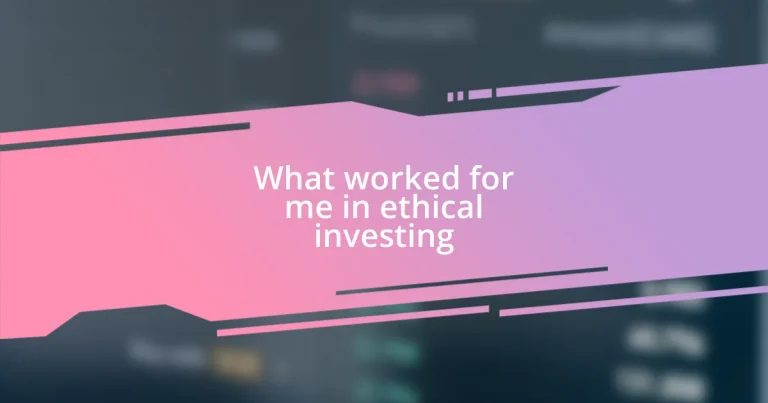Key takeaways:
- Ethical investing involves aligning financial decisions with personal values and considering social, environmental, and governance factors.
- Thorough research of companies’ practices and impact is crucial; ethical labels do not always guarantee ethical practices.
- Diversifying investments across various ethical sectors broadens positive impact and reinforces the importance of regular monitoring and reassessment.

Understanding ethical investing
Ethical investing, for me, has always been about aligning my financial decisions with my values. I vividly remember the first time I researched companies for my portfolio. It felt like a treasure hunt—not for monetary gain, but for businesses making a positive impact in the world. Isn’t it rewarding to know your investments are contributing to causes you’re passionate about?
I often find myself pondering: what does it really mean to invest ethically? For me, it means looking beyond profits and considering the social, environmental, and governance (ESG) factors of a company. When I invested in a renewable energy firm, I felt like I was part of a bigger movement toward sustainability. It wasn’t just about making money; it was about supporting a vision for a healthier planet.
For newcomers, ethical investing might seem daunting. Yet, I’ve learned that it starts with self-reflection—what issues resonate with you? Personally, my journey began with my concern for climate change, guiding me to focus my investments in green technologies. Discovering how my money could drive positive change was not just enlightening; it was empowering. How about you? What causes would you like your investments to support?

Identifying personal values
Identifying personal values is the cornerstone of ethical investing. It’s an introspective process that invites you to explore what truly matters to you. There were moments when I had to confront some uncomfortable truths about my past investments. Reflecting on the types of companies I supported was crucial. Realizing that some investments contradicted my ethos made me rethink my financial strategies. This awareness opened my eyes, helping me forge a path aligned with my values.
To help you clarify your own values, consider the following:
- What social issues deeply resonate with you? (e.g., education, health care, equality)
- Are there specific environmental factors you are passionate about? (e.g., climate change, biodiversity, clean energy)
- What ethical principles do you prioritize in business? (e.g., corporate governance, labor practices)
- Do community development or local businesses hold special significance for you?
- How do you feel about the impact of technology and innovation on society?
Taking the time to answer these questions can guide your investment choices and ensure that your money works toward what matters most in your life.

Researching ethical investment options
When diving into ethical investment options, thorough research is vital. For me, it started with digging into the companies I was considering. I would look into their missions, values, and impact reports. It felt akin to crafting a puzzle: each piece told a story that could either affirm or challenge my belief in their operations. I recall spending hours reading sustainable business practices of a tech firm; their commitment to ethical labor practices left me feeling optimistic about supporting them.
I also found comparing different investment options immensely helpful. I would create charts to visualize their ESG ratings and community engagement levels. This helped me prioritize investments that matched my values. By analyzing performance and alignment with ethical standards, I realized not all “green” companies were equally impactful. For instance, while one company boasted environmentally friendly products, I discovered its inadequate labor practices. This taught me that an ethical label doesn’t always guarantee an ethical approach.
Here’s a simple comparison of different ethical investment options I researched:
| Investment Option | Key Focus |
|---|---|
| Green ETFs | Environmentally friendly companies |
| Social Impact Bonds | Funding community projects |
| Sustainable Mutual Funds | Broad ESG criteria |

Evaluating company practices and impact
Evaluating a company’s practices is more than just checking a box; it requires me to dig deeper into the heart of their operations. I remember researching a clothing brand that promoted itself as eco-friendly. As I examined their supply chain, I discovered troubling labor conditions that contradicted their green marketing. It was a rude awakening, reminding me how essential it is to look beyond the surface.
Impact assessments are crucial in determining whether a company genuinely lives up to its promises. I learned to seek third-party certifications, like Fair Trade or B Corp status, that could offer assurance about ethical practices. The moment I found a local coffee shop with such certifications, I felt a sense of pride investing in them. Supporting businesses that not only value people and the planet but also provide transparent information reinforced my commitment to ethical investing.
Have you ever questioned the real impact of your investments? I often find myself reflecting on how my choices contribute to society. When I invested in a renewable energy company, I was hopeful about its commitment to sustainability. However, after some months, I realized their growth often eclipsed genuine community benefits. It was a learning curve, guiding me towards companies that actively engage with and uplift their communities rather than merely profit from them.

Diversifying your ethical portfolio
Building a diverse ethical portfolio feels like weaving a rich tapestry of values and investments. I remember when I first started off, I focused solely on renewable energy stocks, thinking I was doing the right thing. But as time went on, I realized that investing only in one sector limited my impact. By branching out into areas like sustainable agriculture and socially responsible tech companies, I could amplify my contribution to various important causes—a lesson I wish I had learned sooner.
One experience that stands out is when I invested in a mix of Green ETFs and social enterprises. Initially, I was skeptical about how these different assets would play together. To my surprise, not only did they balance out my risk, but they also introduced me to companies championing various ethical causes, from clean water initiatives to fair labor practices. It’s rewarding to see my investments generate returns while also supporting a spectrum of positive societal impacts.
Have you ever considered how different ethical investments can complement one another? By exploring options beyond just the typical eco-focused funds, you might discover exciting opportunities. For instance, I found that many companies contributing to circular economies—where waste is minimized and resources are reused—also enhance my portfolio’s resilience. It truly reinforces the belief that ethical investing can be both impactful and financially rewarding.

Monitoring and adjusting your investments
Monitoring my investments has become a crucial part of my ethical investing journey. At first, I was hesitant, thinking once I made an investment, it would just take care of itself. However, I quickly learned the importance of regular check-ins. I recall a time when I noticed a company I had invested in consistently missed its sustainability targets. That’s when I realized that being able to adapt to new information is key. It’s about staying engaged and aware.
I often find myself reassessing not just the numbers, but the core values of the companies in my portfolio. There was a period when I felt disheartened after learning that one of my investments was involved in a controversial business practice. I had assumed my investments were just as ethical as the marketing suggested. This revelation pushed me to adopt a more proactive approach—I now schedule quarterly reviews to adjust my portfolio based on ethical standards and practices instead of solely focusing on financial performance.
Have you ever questioned if your investments align with your values over time? When I conduct my evaluations, I ask myself not just if a company is performing well, but also if it still resonates with what I stand for. This constant reflection is essential; it ensures that my money reflects my principles and encourages me to divest from entities that stray from responsible practices. It’s empowering to know that my choices can create real change, both financially and ethically.

Learning from ethical investment experiences
Reflecting on my ethical investment experiences often leads me to moments of clarity that have shaped my approach. Once, I stumbled upon a small cooperative focused on providing fair wages to local artisans. With a small investment, I witnessed not only financial growth but also the profound impact of empowering individuals in underserved communities. It made me realize that ethical investing isn’t just about numbers; it’s about fostering positive change and connection.
I’ve also learned that networking with fellow ethical investors can be incredibly eye-opening. I remember attending a local meet-up where someone shared their journey of divesting from a company that went against their values, despite earlier financial success. This resonated with me deeply—how often do we prioritize profit over principle? It encouraged me to take a closer look at my own portfolio, reminding me that aligning investments with my ethics is paramount, even if it means letting go of lucrative options.
One significant lesson I’ve internalized is that ethical investing is not always linear. I once invested in a certified B Corporation that seemed like a perfect fit, only to discover their practices weren’t as transparent as I had hoped. This prompted me to delve deeper into due diligence and comforted me in knowing that growth often comes from discomfort. Have you had moments that challenged your perspective on your investments? Those experiences carve the path to smarter, more responsible choices, ultimately shaping a portfolio that reflects who you are.












